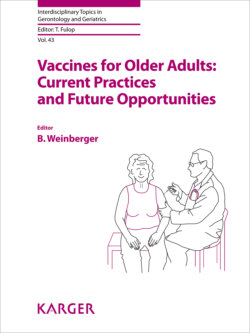Читать книгу Vaccines for Older Adults: Current Practices and Future Opportunities - Группа авторов - Страница 43
На сайте Литреса книга снята с продажи.
Vaccination in the Elderly
ОглавлениеThe old paradigm states that the response of elderly to vaccinations is poorer than that of young and middle-aged individuals [1, 143]. Approaches to bypass this problem include revaccinations, higher dosages of the vaccines, and adjuvants [3, 4, 144]. However, currently there are several vaccines recommended (or even designed) for old subjects to prevent vaccine-preventable infectious diseases [144]. The most important are the annual influenza vaccine, the pneumococcal vaccine and the vaccine against varicella zoster [9, 145]. The recommendations are different depending on the country.
As described above for NK cells, there are changes in the immune response with aging in both the innate and the adaptive parts of the immune system. These changes preclude the success of vaccination in the elderly [1]. As stated above, most of the earlier vaccine studies showed, mainly with the influenza vaccine, a decreased protection in old age [146, 147]. This led to the misconception that vaccination in the elderly is not efficient, which in turn discouraged many doctors to propose them. It is of note that even if from the immunological measurements it seemed that the vaccine was not efficient, from a clinical point of view vaccines decreased overall mortality, hospitalization, myocardial infarction, and even institutionalization in the elderly cohort [148].
Thus, several recent studies appeared to show that vaccination in elderly may be as effective as in adult subjects. The SHINGRIXTM vaccine for varicella zoster is the best example, as this was over 80% effective even in those 80+ [144]. It is of note that this vaccine used an adjuvant which could make the difference, showing that if an adequate vaccine is used, an increased protection may be obtained in elderly [3]. The group of Dr. Larbi also showed no changes in influenza vaccine reaction in Singaporean elderly [6, 7].
Thus, vaccination of elderly with adequate vaccines may overcome changes in the immune system with aging. As described above, the NK cells may be important players in vaccine efficacy; thus, targeting them may also improve the vaccine efficacy in old individuals.
